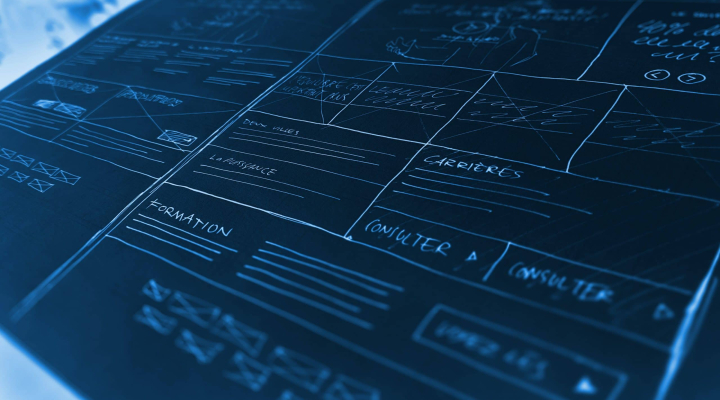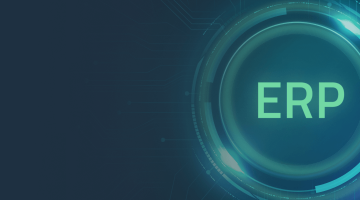
Custom accounting software: Concept and advantages
Accurate and efficient control over the company’s money is required for any business that wants to avoid financial problems. With the rise of digital tools and the Internet, accounting approaches evolved from routine paperwork (literally) into smooth online tasks with a high level of automation. Today, a lot of vendors deliver branded applications for accounting, but often, clients opt for custom accounting software because of its uniqueness and suitability.
In this guide, you will find both basic info about custom programs designed for accountants and advanced tips on choosing and implementing these apps.
Understanding programs and accounting software development process
First of all, let’s look at the most basic things. You may know that there are two major software types by development: off-the-shelf and custom.
The first type is similar to the branded training kits of your favorite football club. Vendors create hundreds or thousands of t-shirts and shorts, add logos and the club’s colors, and then deliver identical packages to customers. Software companies do the same as they create one or two sets of functions, add the brand’s name, and sell apps without changes.
On the contrary, custom products are like these t-shirts to which you can add your name and the desired number. You know, it will look like you’re a football player on the beloved team. In this case, manufacturers have to customize t-shirts for each client as well as developers implement all the desired features and deliver a completely unique app every time.
Further, we want to talk a bit more about custom software tools designed for accountants especially. Read on to find definitions, types, and main stages of the development process.
Customized accounting software definition
To get the idea, let’s check two parts of the «custom accounting software» definition:
- Custom – created in accordance with a personal order.
- Accounting – the system of recording and reporting on business transactions.
However, the exact definition will be slightly different for each client. Teams choose to customize accounting software because of the perfect or almost perfect suitability. Say, a church can barely use a traditional off-the-shelf program. It requires dedicated modules for donation tracking and management of campuses. Similarly, a fully commercial real estate agency focuses on property monitoring, while banks must have timely reporting tools.
Thus, only you, as a client, can define this term. Further, we will talk about applications created from scratch and tailored to different tasks of financial departments, but the accounting software development process will be a bit different for each customer.
Custom accounting software development
Despite the nuances can be different, the overall concept of software creation and implementation is always similar. Check five key steps of this process:
- Research. Here, you should agree on terms and conditions with the chosen dev firm, tell about your wishes and requirements, listen to ideas, and consider not only current but also upcoming needs, e.g. ones focused on vertical and horizontal scaling.
- Design a template. After approving basic concepts, developers will start working. Usually, they plan the project, consult with employees and managers, arrange functions, and, finally, deliver an outline of the planned product to you.
- Develop a product. If everything is alright with the template, devs will begin programming itself. They can either create an MVP with only basic features or design the final version with all the functions implemented.
- Test and release. Once the product is ready, engineers will test it to ensure that it works properly and completes the required tasks. Finally, the team will deploy the created program (via your server or cloud) and connect it to other company systems.
- Support. The post-launch phase provides for regular tech maintenance with bug fixing and customer support focused on boosting your employees’ experience. Other services may include training, upgrading, and reengineering.
We at DICEUS feature one of the most efficient software development models – Agile. According to it, the entire process is divided into separate phases or sprints during which the team implements one or a few core features. We test the software after each sprint to release the product only when everything works properly. Of course, we consider feedback from clients and potential users. Agile allows us to deliver only polished and efficient accounting apps.
Custom software types
At the end of this section, take a quick look at accounting applications and their differences. Don’t limit yourself with these examples if you need a more exotic program. Our developers are always ready to design something unusual, so feel free to share your ideas during consultations.
The most traditional examples of top accounting software are as follows:
- Spreadsheets and dashboards. Simple tools that provide for organizing, sorting, searching, and calculating data via structured tables. Google Sheets and Excel are the most famous examples of this type. Spreadsheets will suit small businesses.
- Commercial apps. Perfect programs for SMBs that come with more functions. They focus on reporting and analyzing so your accountants will be able to generate and send reports, monitor money flows, check for new changes, and adapt for them.
- Enterprise-grade software. The most complex and powerful applications that often deliver valuable automation functions. They can deal with large databases and analyze Big Data. Often, these programs evolve into ERP solutions.
For various business, custom dashboard software is useful. We’re ready to create it for you.
Main functions of custom accounting apps
If you opt for custom solutions, it’s better to know what features you want to get. Basically, accounting programs must come with a few core modules that cover the main functional areas of the related departments. Additionally, custom devs can easily add more tools tailored to your needs exclusively.
Explore the list below to find out the most popular and necessary functions for accounting systems. These ideas are viable but not exhaustive, so ask employees and stakeholders about their opinions. One good brainstorm can help greatly if you don’t know how to develop a simple accounting software or its parts.
Well, a traditional app should be able to:
- Calculate taxes. Accounting is about taxation rules, payments, and reports, so you want to get a handy tool that will calculate this stuff right on time. The module should handle VAT as well as other taxes.
- Generate reports. Depending on the company’s size and its market niche, accountants should deliver timely reports each month, quarter, or year. Commercial and enterprise apps automate the reporting process, including auto mailing.
- Handle invoices. Businesses can send and receive invoices by interacting with your clients and dealers. The software also handles invoice orders, prints, and emails. More elaborate apps even store the partners’ data.
- Integrate with other apps. It’s barely possible to utilize only one application. Thus, accounting tools should be compatible with other systems, e.g. CRM or e-commerce platforms, online banking apps, and so on.
- Process payroll. Salaries are also extremely important for accountants. With a module that manages payroll automatically, employees can forget about manual calculations, errors, and delays. The software also considers bonuses and fines.
- Set multiple access levels. To deliver the best security, accounting apps often provide for several access levels. Say you can set rights for managers, tech staff, regular employees, and more. Ideally, find a system with 5-6 levels.
- Support e-payments. Nowadays, it’s impossible to avoid electronic payments. Connect a module that handles digital banking options, for instance, credit cards, e-wallets like PayPal, or other solutions.
- Track expenses. Apart from invoices, payrolls, and profits, accountants should remember about business expenses. With the software, you can calculate all payments faster and with a lower chance of human-related error.
- Visualize data. Finally, all the mentioned points can be represented as charts, maps, and diagrams. With visual elements, it’s easier to analyze and evaluate performance indicators. Surely, graphics are a must-have for reports.
Keeping these points in mind, you will find the most important functions quicker. Just try to understand the major goals of the company and how the planned application can help in reaching these goals. Surely, consult with developers to get a fresh view. For example, our employees are skilled and experienced enough to suggest the best functional modules for any client from any industry. In addition, we also handle business analysis to deliver more accurate insights.
The defining benefits of custom solutions
Custom accounting programs are wonderful because each client can get exactly what his/her company needs. Thus, the benefits are slightly different. Local pharmacies appreciate a high level of data protection and a comprehensive vision of money flow. International banks can easily manage dozens of branches using a single app. Manufacturers and distributors feature more streamlined interactions without misconceptions.
Further, we list three main strengths of custom accounting software regardless of the industry.
1. Store and process data efficiently
Modern digital solutions provide for storing core information in central databases with wide access rights for the company’s employees. As a result, accountants can use a simple interface with powerful sorting/filtering options to quickly get data they require right now. In the era of Big Data, such apps are indispensable as they can deliver and process financial stuff almost instantly. Automation tools and smart databases reduce money and time expenses greatly.
2. Reduce human errors
As accounting programs take care of various tasks, operators can be sure that everything’s fine. Even the most professional accountants are just humans who can miss a mismatch in calculations or forget to double-check a report. Digital assistants are almost flawless if they were tested carefully. Thus, they protect your business from painful errors followed by huge financial or reputational losses.
3. Save time
Overall, people use various digital tools to streamline processes and spend less time on minor tasks. Really, it’s much more comfortable to delegate notifications, scheduling, and reporting to the software and focus on challenges that require creative thinking. Accounting applications optimize the financial management of any business. Another cool result is that you will not have to expand staff because a lot of functions will be handled by apps.
Potential expenses on custom accounting software development
Well, it should be clear now how accounting tools work and why they are useful. But here’s one pretty important question: are these programs affordable at all? Let’s look at the average cost to build custom accounting app.
In this guide, we don’t want to focus on hourly rates. Our development team focuses on the final result instead of time spent, so we’re responsible for quality and accuracy. Acting as tech partners, we deliver quote-based prices for each project exclusively. Generally, this approach is more professional than freelance-like hourly rates because you can easily add any function and service you want, discuss the final price, and enjoy the product without the need to pay more later.
Basically, the average costs of full projects are as follows:
- For a small business: $1,000-$50,000.
- For a midsize business: $5,000-$200,000.
- For an enterprise. $100,000-unlimited.
There are dozens of factors that affect the final price, including the number of functional modules, the number of users, and security requirements. As a rule, the quicker you want to get your app, the more expensive it will be. Finally, extra services like user training, support, and maintenance feature higher prices.
How to develop a simple accounting software with DICEUS
At the end of the day, each business owner who wants to get a custom app has two options. On the one hand, you can create a product by yourself. But this approach is time-consuming and pretty difficult.
Another option relates to a partnership with dedicated developers like our company. In this case, we handle all the tech questions and deliver the desired product just in time. You can specify needs and wishes, provide feedback, ask for necessary changes, and order different services: business analysis before the launch, user training, and tech support after the release.
By cooperating with custom devs, you save on money, time, and nerves. Thanks to Agile methodology, we deliver functions one-by-one and can easily change/replace them. Additionally, we can create an MVP to show how the software works. As for the management, you can handle it internally or delegate to our specialists, as well.
Want to learn more about custom software solutions? Just check our blog!
FAQ
Further, you can find the most essential highlights about custom accounting software. Read them carefully to remember key ideas.
What is accounting and inventory software?
Digital programs that simplify and automate financial management, including tax control, payroll processing, payments, reports, and integrations with third-party software.
Which type is the most preferable?
Custom applications are perfect when you have specific requirements and want to get a unique product. Premade software is good when you’re happy with generic features.
How to create custom accounting software?
Just contact our company! Alternatively, you can study coding, project management, software testing, marketing, and so on… Better, find a dedicated team, really.
For more tech insights and pitfalls, look at the article about custom software development.
How much does the development cost?
Roughly from $1,000 to $10 million and even more. The final price of customizable accounting software depends on exact features, access levels, time of development, and post-launch services.
Where to find top accounting software?
For off-the-shelf apps, check popular vendors like Zoho or SAP. You also can find various ratings, e.g. at Capterra. For custom tools, find a dev team that has relevant skills for your project.
Conclusions
Software for accounting departments focuses on simplicity, automation, and efficiency. Companies can benefit from implementing custom tools with only the required functions. To get a unique application for your accounting team, you can find us and get free consultations. Wait no more if you need modern digital solutions!





